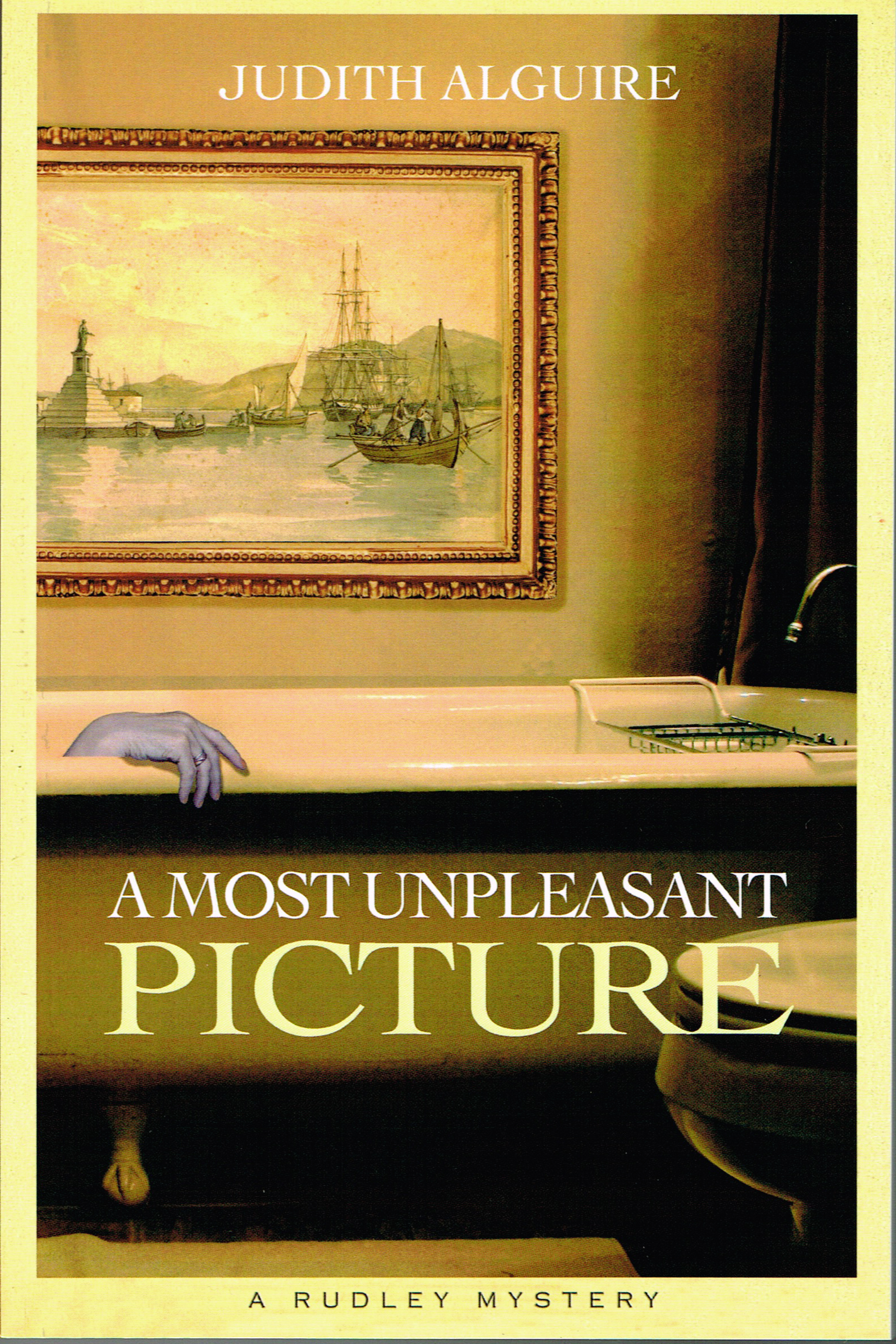
About the book
When art aficionado Leonard Anderson learns his wealthy patron, Luella Pryce, is to endow the local gallery on the Caribbean island of St. Napoli with her fabled art collection he is stunned. How could she? The Cartwrights, the most glorious of her paintings, had been practically promised to him!
Desperate to keep them for himself, Leonard removes the Cartwrights from Luella's mansion for "cleaning," substituting clever forgeries in their stead. To erase evidence of fraud, he connives with his unscrupulous nephew to set fire to Luella's. Unfortunately, the old dear is in the house at the time and perishes along with her art.
At the time, no one suspects Leonard, but before long, money woes force him to put the Cartwrights on the black market. On tiny St. Napoli, though, everybody knows everyone's business, so north to Canada he goes, arsonist nephew in tow, to a lovely retreat in Ontario cottage country, a mere stone's throw from the Pleasant Inn, where—he is certain—he can do business in secret.
But alas …
Dead bodies are the Pleasant's curse. The inn's curmudgeonly proprietor Trevor Rudley and his saintly wife Margaret once again hope the summer will pass with nothing more lethal than a sunburn and one too many gins. But when a dead body is found in their boathouse, they know the curse is not about to lift. At least not any time soon.
About the author

Judith Alguire is a Kingston, Ontario writer, whose novels include Pleasantly Dead, The Pumpkin Murders, A Most Unpleasant Wedding, Peril at the Pleasant, and Many Unpleasant Returns, all of which are part of the continuing Rudley Mystery series. Her short stories, articles, and essays have appeared in such publications as The Malahat Review and Harrowsmith, and she is a past member of the editorial board of the Kingston Whig-Standard. A graduate of Queen’s University, she has recently retired from nursing.
Excerpt
from Chapter One
Several years beforeLuella Pryce, a wealthy older lady, art collector, although not much of a connoisseur, is speaking to her friend Leonard Anderson about a proposed acquisition.
“Are you sure those examples of Cartwright will be a good acquisition, Leonard?”
He gave her a grave look. “If you don’t buy them Luella, I’m certain someone will snap them up.”
She wavered. “Oh, dear, we can’t have that.”
Leonard waited patiently.
“You say it would be quite a coup to acquire these,” she added.
He controlled the impulse to scream. “All I can tell you, Luella, is that in years to come as these are compared to his later works, they will stand in very good stead.” He paused. “And the pencil sketches are included.”
“Oh, I don’t like those at all. They look like something a four-year-old did. If we get the oils, you can have the drawings.”
He smiled. “Thank you, Luella.”
She frowned at the paintings. “They seem a little primitive. They don’t have that finished look of some of his later works.”
He seized the moment. “And that is why you want these. Cartwright painted these in the full bloom of his creativity. Then he became popular.” He shook his head, gave her a sad look. “I can’t tell you what popularity does to the creative process.”
She gave him a look that said he should.
“Some artists start painting what they think the public wants. They no longer paint for that most important audience of one.”
Leonard waited for her to say one what?, gritting his teeth to control his tedium. He was fond of Luella. The old lady had been generous to him in so many ways. His main problem was usually gently spurning her coquetry, giving her the impression women just weren’t his cup of tea, something she accepted and didn’t seem to mind at all. It did put a crimp in his romantic life. But then art was his main passion . He satisfied his other needs discreetly. She usually accepted his judgments about paintings—at least about the investment value—without question. The problem here was that the pieces were small. Luella tended toward the large. He sometimes thought she chose painting like pieces of cake, something else she was rather fond of. Mostly she liked him and liked having him around. Her arm candy she liked to call him.
He leaned forward, pointed over her shoulder. “Look at the fearlessness of the brush strokes. These are the work of an artist pouring his heart onto the canvas.” He straightened. “Frankly, I find much of his later work…” he paused...”studied.”
That was the magic word. She knew how he hated anything “studied”. She nodded, gave him a sweet smile over her shoulder. “You know what’s best, Leonard.”
He smiled, nodded, diffidently. “It’s my vocation, Luella.”
“You’re so smitten with them, Leonard, I’m surprised you didn’t try to acquire them for yourself.”
He raised his brows. “That would hardly be ethical, Luella. I was acting as your agent.” Not to mention the fact, he thought, that I expect you’ll will the entire collection to me by and by.
She patted him on the arm, let her hand linger. “The price is rather high.”
“Not as high as it will be later.”
“I guess that’s true of everything,” she said.
He waited. Luella could be ridiculously cheap about things. Her house was full of treasures, yet she refused to get a proper alarm system, relying on an aged poodle that spent its days in a doghouse on the front lawn to raise the alarm. It occurred to him her dogs were usually deaf. The house, although elegant was dusty and ill kept. She refused to have household staff, apart from an elderly cleaning lady who came in once a week and a cook who prepared a week’s worth of meals and delivered them frozen. She smoked like a chimney, something that made him cringe when he thought of her art collection. She was mostly interested in her clubs, lawn bowling, lawn tennis, croquet which she played with malice, her patronage of the local art gallery, her women’s reading group where she loved to go and bore everyone by reading Tennyson badly.
“You will make sure they are properly authenticated,” she said.
Of course.” As always he did a second examination.
“Will they require cleaning?”
“They are in excellent condition,” he said.
They would need cleaning many times over the years, he knew, if she continued to cover them with tar from her unfiltered Pall Malls. The thought made him wince. Although her collection was good, he had never developed an emotional attachment to most of the works. But these, the Cartwrights, were exquisite. They tugged at his artistic heart in a way no other painting had done in a very long time. The vibrancy of the colours, the finely controlled impetuosity of the brush strokes. It was as if the painter were driving a team of spirited horses along a narrow cliff road and had just barely managed to control the wild animals. What a shame Cartwright had lost that.
“You should consider getting a proper alarm system,” he said finally.
She gave him an indulgent look. “Pepi will look after that.”
Pepi the latest poodle was so old all of his teeth had fallen out. Leonard thought the only weapon at the dog’s disposal was the foul-smelling gas he passed with disturbing regularity.
“Besides,” Luella continued, “who could possibly sell my paintings on the island without everybody knowing about it?” She lowered her voice. “I practically own the Chief of Police.”
The chief is easily owned, he thought.
“So that’s it,” she said. “Shall we stop at the club for a drink to celebrate.”
It wasn’t a question but an edict. Another thing Luella was rather fond of was her liquor.
“And how is that nephew of yours? What’s his name. Tigan, Timson?”
“Tibor,” he responded. “Tibor is fine.”
“You’re doing a fine job with him, Leonard."
“Thank you,” he said. He wasn’t doing anything with him, really, apart from providing him with a stimulating environment. But, at least he was there. He hadn’t been left in the care of strangers while his parents gadded about more interested in their society friends.
“It’s not easy taking in an orphan,” she said. “Especially one whose parents have died so violently. Car accident, wasn’t it? Engine failure?”
“So they say,” he murmured.
The Pleasant Inn… around the same time.Trevor Rudley headed out toward the front yard with a pot of mortar. Margaret accosted him as he passed the desk.
“Rudley, where are you going with that?”
“To repair the base of the urn,” he said.
“Shouldn’t you get a professional to do that?” she asked, meaning someone who knows what they’re doing.
“Nonsense,” he said. “It’s a simple do-it-yourself job.”
If he does it himself, it will be far from simple, she thought.
“Why don’t you get Mr. MacAvoy in?”
He crossed his eyes. “Margaret he’s the one who backed his truck into it in the first place.”
“He didn’t mean to.”
“But he did.” He ran a distracted hand through his hair. “He’s as much of a nuisance as that brother of his. How could one family produce a catastrophic handyman and an irritating laundry man?”
“I don’t know, Rudley.” She paused. “I think we should consider getting a full-time repair man around here.”
“Nonsense, Margaret, why would we need one of those. I can repair that urn to last a millennium.” With that he went on out the door.
She watched him go. I believe he’s getting a bald spot at the back of his head, she mused.
PURCHASE FORMAT
PAPERBACK
EBOOK
$9.99
242 pages
Epub ISBN: 978-1927426-96-8
Accessible Ebook. This Publication meets the requirements of the EPUB Accessibility specification with conformance to WCAG 2.0 Level AA. This book contains various accessibility features such as alternative text for images, table of contents, page list, landmark, reading order, and structural navigation.
Download from Signature Editions and add to your eReading device or buy from these retailers:
device or buy from these retailers:










 Back to top
Back to top